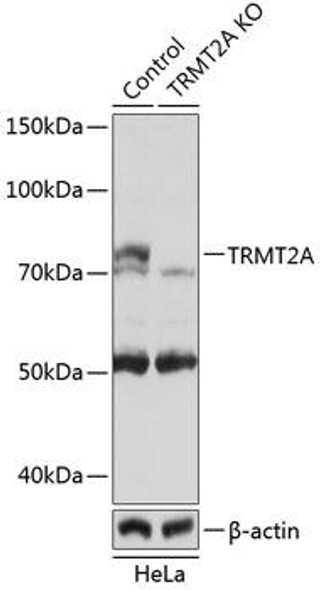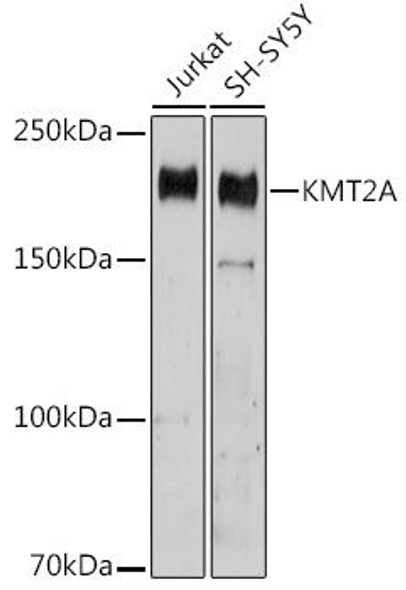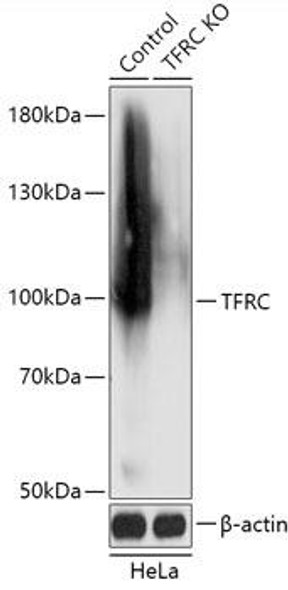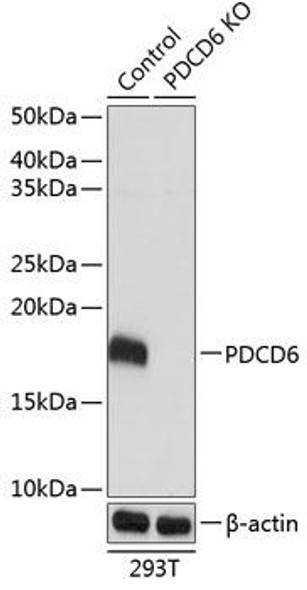Anti-NCOA4 Antibody (CAB5695)[KO Validated]
- SKU:
- CAB5695
- Product Type:
- Antibody
- Reactivity:
- Human
- Mouse
- Rat
- Host Species:
- Rabbit
- Isotype:
- IgG
- Antibody Type:
- Polyclonal Antibody
- Research Area:
- Epigenetics and Nuclear Signaling
Description
Anti-NCOA4 Antibody (CAB5695)[KO Validated]
The NCOA4 Polyclonal Antibody (CAB5695) is a valuable tool for researchers studying NCOA4, a protein involved in the regulation of iron metabolism and autophagy. This antibody, produced in rabbits, exhibits high reactivity with human samples and has been validated for use in Western blot applications. By specifically binding to the NCOA4 protein, this antibody enables the detailed analysis and detection of NCOA4 in various cell types, making it an essential component for studies in the fields of metabolism, autophagy, and cancer research.NCOA4, also known as nuclear receptor coactivator 4, plays a crucial role in the maintenance of iron homeostasis by mediating the degradation of ferritin through autophagy.
Dysregulation of NCOA4 has been linked to various diseases, including cancer and neurodegenerative disorders, highlighting its importance as a therapeutic target. By gaining a better understanding of NCOA4 function, researchers can develop novel treatments for conditions associated with iron metabolism and autophagy dysfunction. The NCOA4 Polyclonal Antibody is a valuable tool that will aid in furthering these important research efforts.
| Antibody Name: | Anti-NCOA4 Antibody [KO Validated] |
| Antibody SKU: | CAB5695 |
| Antibody Size: | 20uL, 50uL, 100uL |
| Application: | WB IHC IF |
| Reactivity: | Human, Mouse, Rat |
| Host Species: | Rabbit |
| Immunogen: | Recombinant fusion protein containing a sequence corresponding to amino acids 495-614 of human NCOA4 (NP_005428.1). |
| Application: | WB IHC IF |
| Recommended Dilution: | WB 1:500 - 1:2000 IHC 1:50 - 1:100 IF 1:50 - 1:200 |
| Reactivity: | Human, Mouse, Rat |
| Positive Samples: | A375, HeLa, MCF7, 293T, Mouse testis, Rat testis |
| Immunogen: | Recombinant fusion protein containing a sequence corresponding to amino acids 495-614 of human NCOA4 (NP_005428.1). |
| Purification Method: | Affinity purification |
| Storage Buffer: | Store at -20'C. Avoid freeze / thaw cycles. Buffer: PBS with 0.02% sodium azide, 50% glycerol, pH7.3. |
| Isotype: | IgG |
| Sequence: | SEWL IRPP YKEG SPKE VPGT EDRA GKQK FKSP MNTS WCSF NTAD WVLP GKKM GNLS QLSS GEDK WLLR KKAQ EVLL NSPL QEEH NFPP DHYG LPAV CDLF ACMQ LKVD KEKW LYRT PLQM |
| Gene ID: | 8031 |
| Uniprot: | Q13772 |
| Cellular Location: | |
| Calculated MW: | 32kDa/69kDa/71kDa/73kDa |
| Observed MW: | 70kDa |
| Synonyms: | NCOA4, ARA70, ELE1, PTC3, RFG |
| Background: | This gene encodes an androgen receptor coactivator. The encoded protein interacts with the androgen receptor in a ligand-dependent manner to enhance its transcriptional activity. Chromosomal translocations between this gene and the ret tyrosine kinase gene, also located on chromosome 10, have been associated with papillary thyroid carcinoma. Alternatively spliced transcript variants have been described. Pseudogenes are present on chromosomes 4, 5, 10, and 14. |
| UniProt Protein Function: | NCOA4: Enhances the androgen receptor transcriptional activity in prostate cancer cells. Ligand-independent coactivator of the peroxisome proliferator-activated receptor (PPAR) gamma. Defects in NCOA4 are a cause of thyroid papillary carcinoma (TPC). TPC is a common tumor of the thyroid that typically arises as an irregular, solid or cystic mass from otherwise normal thyroid tissue. Papillary carcinomas are malignant neoplasm characterized by the formation of numerous, irregular, finger-like projections of fibrous stroma that is covered with a surface layer of neoplastic epithelial cells. A chromosomal aberration involving NCOA4 is found in thyroid papillary carcinomas. Inversion inv(10)(q11.2;q11.2) generates the RET/NCOA4 (PTC3) oncogene that has been found in sporadic and radiation-associated post-Chernobyl thyroid papillary carcinomas. 2 isoforms of the human protein are produced by alternative splicing. |
| UniProt Protein Details: | Protein type:Oncoprotein; Nuclear receptor co-regulator Chromosomal Location of Human Ortholog: 10q11.2 Cellular Component: nucleus Biological Process: male gonad development Disease: Thyroid Carcinoma, Papillary |
| NCBI Summary: | This gene encodes an androgen receptor coactivator. The encoded protein interacts with the androgen receptor in a ligand-dependent manner to enhance its transcriptional activity. Chromosomal translocations between this gene and the ret tyrosine kinase gene, also located on chromosome 10, have been associated with papillary thyroid carcinoma. Alternatively spliced transcript variants have been described. Pseudogenes are present on chromosomes 4, 5, 10, and 14. [provided by RefSeq, Feb 2009] |
| UniProt Code: | Q13772 |
| NCBI GenInfo Identifier: | 8928226 |
| NCBI Gene ID: | 8031 |
| NCBI Accession: | Q13772.1 |
| UniProt Secondary Accession: | Q13772,Q14239, A8K8W5, B4E260, E9PAV7, J3KQN8, |
| UniProt Related Accession: | Q13772 |
| Molecular Weight: | 73,649 Da |
| NCBI Full Name: | Nuclear receptor coactivator 4 |
| NCBI Synonym Full Names: | nuclear receptor coactivator 4 |
| NCBI Official Symbol: | NCOA4 |
| NCBI Official Synonym Symbols: | RFG; ELE1; PTC3; ARA70 |
| NCBI Protein Information: | nuclear receptor coactivator 4 |
| UniProt Protein Name: | Nuclear receptor coactivator 4 |
| UniProt Synonym Protein Names: | Androgen receptor coactivator 70 kDa protein; 70 kDa AR-activator; 70 kDa androgen receptor coactivator; Androgen receptor-associated protein of 70 kDa; Ret-activating protein ELE1 |
| Protein Family: | Nuclear receptor coactivator |
| UniProt Gene Name: | NCOA4 |
| UniProt Entry Name: | NCOA4_HUMAN |







![Anti-NCOA4 Antibody [KO Validated] (CAB5695)](https://cdn11.bigcommerce.com/s-h68l9z2lnx/product_images/j/121/A5695_1__22905.jpg)
![Anti-NCOA4 Antibody [KO Validated] (CAB5695)](https://cdn11.bigcommerce.com/s-h68l9z2lnx/product_images/c/861/A5695_2__25262.jpg)
![Anti-NCOA4 Antibody [KO Validated] (CAB5695)](https://cdn11.bigcommerce.com/s-h68l9z2lnx/product_images/m/803/A5695_3__02894.jpg)







